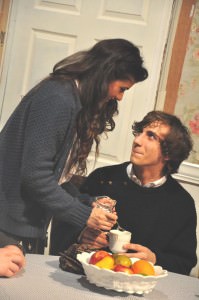The McLean Theatre Company, McLean High School’s theater group, puts up Arthur Miller’s classic A View from the Bridge. Under the direction of Amy Poe, the high school cast handles the mature content and issues of the play with poignant sensitivity and impressive effectiveness.

A View from the Bridge is set in 1950s America, in Redhook, an Italian American neighborhood near the Brooklyn Bridge in New York. The main character in the story is Eddie Carbone, an Italian American longshoreman, who lives with his wife, Beatrice and his orphaned niece, Catherine. When Beatrice’s Italian cousins, illegal immigrants, arrive to stay, hoping to leave behind hunger and unemployment for a better life in America, the Carbone family’s life changes forever. Their loves and their loyalties are tested – and tragedy results.
Poe begins by creating the realism of the cramped Redhook neighborhood and Carbone home by setting the audience within the set itself. The audience is literally brought into the theater by way of a tenement street, through the Carbone home’s front door and seated in various styles of living room chairs in the intimate black box setting. The era of the 1950s is effectively evoked with time appropriate music and the show’s playbill presented in newspaper format. With the stage set in such elaborate detail, the question remained whether the players would reach the same level of authenticity. Fortunately, the group of young thespians, by and large, was effective in the portrayal of the challenging subject matter.

The production begins with the appearance of the one-man Greek Chorus, neighborhood lawyer, Mr. Alfieri (Nick Stone). Acting as both the narrator and the veritable bridge between cast and audience, Stone’s Alfieri proffers a solid representation of the steadying voice of the law. His calm offers a sensory difference compared to the emotionally-raw qualities of the show’s other characters. Alfieri also effectively conveys the significance of modern society’s inability to overcome humanity’s deepest flaws. And more than simply noting the inability, Stone’s Alfieri communicates the frustration and awareness inherent in that shortcoming.
This production lives and dies, though, on the shoulders of the actor portraying the lead character Eddie Carbone. Fortunately, Damien Leverett effectively portrays this tragic figure embodying the poles of guilt and hope Miller prescribes. From the production’s beginning, Leveritt treats the audience to a highly nuanced representation of the blue-collar worker struggling to survive and sustain his family while maintaining his sense of self in a challenging world. His visceral transition from confident head of household to man stripped of “name” is artfully undertaken. And within the somewhat cramped confines of the black box, the audience feels Eddie’s downward spiral rather than merely witnessing it. Carbone’s challenged wife is, likewise, artfully rendered by Siena Richardson. Although at times difficult to hear, Richardson’s Beatrice clearly conveys the frustration and inability to stem the tide of destruction washing over the family.
Remaining primary characters include Catherine Carbone (Lexie Shoaibi), Marco (John Williams) and Rodolpho (Max Johnson). Shoaibi offers audiences a nicely crafted development of Catherine’s character transitioning from fawning niece to questioning young adult to a woman making decisions for herself. Williams properly offers a straight forward presentation of the role of Marco. Johnson provides an atypical and mostly effective portrayal of Rodolpho. Traditionally offered as more romantic lead fare, Johnson adds significant humorous elements to the role. While especially effective in opening scenes, the lighter elements appear a bit out of place as the story progresses. Near the production’s end, Johnson provides Rodolpho with the appropriate backbone rounding out the character which previously lacked this strength.
The production, already well established with solid performances, is further enhanced by the interactions – sometimes sensitive, sometimes volatile – between Leveritt and fellow characters. The relationship between Eddie and Beatrice devolves artfully from that of the familiar blue-collar to couple torn in two. Eddie’s and Catherine’s transition from a caring uncle/niece to convoluted mature man/young women offers appropriate challenge to actors and audience alike. And, through just two scenes, the Eddie/Alfieri interaction sets a tone of train rumbling tragically down the wrong track.

The production’s level of detail extends through key design elements. Set Designer Zhina Kamali pursues an aggressive and unusually elaborate design for a black box theater implementing both a tenement street and the Carbone home. Perhaps it is because of this unique framework that the set works so effectively. Lighting Design Max Lindsay’s mostly utilitarian design is nicely punctuated by the garishly-red splash both from top as well as from within the phone booth during a most poignant moment. Emma Paquette’s costume design, implemented by the numerous costume crew, is nicely crafted and unusually outlined within the show’s playbill-appearing like advertising from a local department store circa 1950-guiding the audience through the costume choices. Josh Alvarez’ sound design provides effective ambient sound grounding the production. Properties Designer, Cara Schaumburg, completes the Carbone’s home nicely with era-appropriate magazines, board games and a working turntable and Alieri’s office with another era-appropriate device – the manual typewriter.
Under Poe’s guidance, the McLean Theatre Company is expanding on its solid tradition of theatrical excellence. Following from its recent production of Women & Wallace, which was selected to represent Virginia at the 2012 International Thespian Conference this summer, this production continues the group’s choice to put up challenging fare.
A View from the Bridge is another noteworthy production adding to this group’s list of accomplishments.
A View from the Bridge plays through March 29, 2012 at McLean High School – 1633 Davidson Road, in McLean, VA. For tickets, purchase them online.
LINK
Read McLean Presents A View From the Bridge by Alex McVeigh in The McLean Connection.




